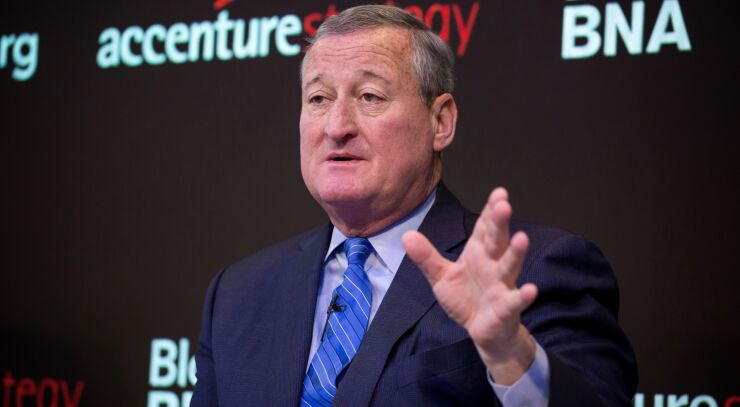A revised budget proposed by Philadelphia Mayor Jim Kenney reflects a massive revenue shortfall the city faces as a result of the economic shutdown related to the COVID-19 pandemic.
The updated $4.9 billion 2021 fiscal plan seeks tax hikes to help combat an estimated $649 million budget hole. The new proposal is $341 million lower than the $5.2 billion budget Kenney initially

“Now with the impact of the virus requiring a stay at home order and the closing of non-essential businesses we face an economic downturn that will equal and probably exceed the worst of the Great Recession of 2008,” Kenney said in a recorded address released Friday morning. “This reality includes a dramatic decline in tax collections from the shutdown of business activity and the resulting drop in wages.”
The Kenney administration is looking to raise around $50 million of new revenues from a series of tax hikes and fee increases, including upping parking taxes to 27% from 22.5% for an estimated $16.9 million in extra income. The nonresident wage tax would also rise from 3.4481% to 3.5019% to bring in around $17.2 million of new revenue.
Property taxes under the revised budget would also jump 3.95%. This hike will help raise $30 million for the general fund to cover deficits in the Philadelphia School District. Kenney is proposing a $252 million contribution to the financially struggling district, which the city
The new budget also includes $370 million in additional spending reductions. The city instituted a hiring freeze on April 20 and part-time, temporary and seasonal worker layoffs are planned. Additional savings will be realized by closing public pools this summer and by agencies cutting $43 million earmarked for project upgrades.
Kenney, who was elected to a second term last November, took steps during his first few years in office to
Philadelphia’s reserve levels will also take a hit from COVID-19 restrictions, with the Kenney administration now planning a 2021 fund balance of $87 million compared with the $316 million goal from early March. This would equate to 1.7% of all spending, falling well below the city’s surplus goal of 6% to 8%. The city is hoping to boost the fund balance to $132 million, or 2.44% of planned spending, by 2024 under the revised five-year plan.
Prior to the current crisis, Kenney proposed earmarking $56.7 million for a newly established recession reserve. The revised budget would lower this deposit to $20 million.
Philadelphia’s general obligation bonds are rated A-minus by Fitch Ratings, A by S&P Global Ratings and A2 by Moody’s Investors Service. The city has a positive credit outlook from Fitch and is viewed as stable by Moody’s and S&P.
An April 27
“While it’s clear that the current crisis will have a major impact on the city’s tax revenue, in both the moderate and severe scenarios, we anticipate that the economy should rebound in calendar year 2021,” said Rhynhart in a statement. “My office will continue to ensure the city is operating efficiently and effectively as we recover from this unprecedented crisis.”





